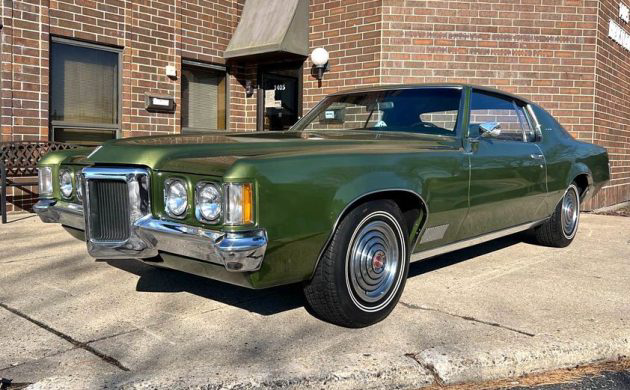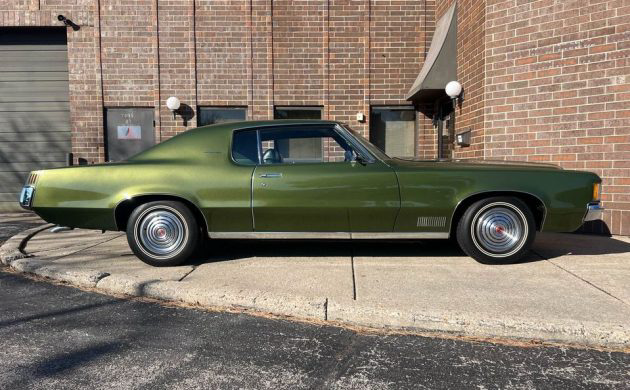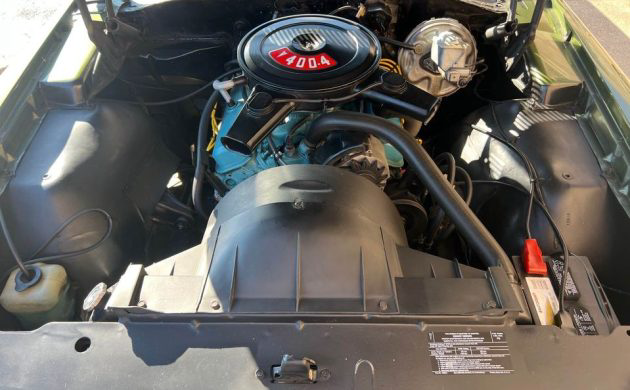Few people in 1970 had any idea how profoundly the automotive landscape would change over the next three years. The carefree days of the 1960s were fading to a distant memory, while the double whammy of tighter emission regulations and a fuel crisis was barely a blip on the horizon. Against that backdrop, this 1970 Pontiac Grand Prix emerged from the factory. It presents superbly, which is unsurprising, considering it has a genuine 43,000 miles on the clock. Its mighty V8 provides excellent performance, and the only thing this classic seems to need is a new home. The seller has listed the Pontiac here on Facebook Marketplace in Itasca, Illinois. It could be yours for $26,900, and I must say a big thank you to eagle-eyed Barn Finder T.J. for spotting this potent beauty.
John DeLorean was a driven man with innovative and practical thinking when he was at the helm of Pontiac, and it’s a shame that his approach didn’t translate to the moment when he was running a company bearing his name. Had that been the case, the story of the DeLorean Motor Company could have been very different. He laid the foundations for the Third Generation Grand Prix in 1967, and by utilizing the same platform the company used on other models, he slashed development time by 50%. Therefore, a car that should have hit showroom floors in 1970 arrived on the market for the 1969 model year. The first owner ordered this Grand Prix in 1970, selecting desirable Verdoro Green paint from the twenty-two shades available that year. Finding fault with this classic is almost impossible because every aspect is in excellent condition. The paint retains an impressive depth of color and shine, and there are no visible flaws in the supplied photos. The panels are laser-straight, featuring some of the tightest and most consistent gaps I’ve seen on any Pontiac from this era. There are no signs of rust or prior repairs, and the trim and tinted glass are spotless.
Lifting the hood reveals one of the cleanest engine bays I’ve seen on any survivor-grade classic of this vintage. It houses the 400ci V8 that sends 350hp and 445 ft/lbs of torque to the road via a three-speed automatic transmission. The first owner selected power assistance for the steering and front disc brakes, meaning the driver won’t raise a sweat maneuvering this gentle giant. I previously mentioned emission regulations, and it is worth reflecting upon the impact these changes had on vehicle performance. The 1972 Grand Prix with a 400 under the hood placed 250hp and 325 ft/lbs at the driver’s disposal. Admittedly, part of the drop was purely theoretical as the industry transitioned from quoting outputs in net rather than gross terms. However, this car should cover the ¼-mile in 15 seconds, while that time ballooned to 16 seconds in 1972. That was the tip of the iceberg, as the situation deteriorated as the 1970s progressed. The seller confirms this Grand Prix is numbers-matching. They don’t mention supporting the evidence for the mileage claim, but the overall condition of every aspect of this gem makes it plausible. Potential buyers should consider this Pontiac as a turnkey proposition. The seller states they wouldn’t hesitate to drive it to California tomorrow, emphasizing their confidence in this classic.
The “Green” theme continues when we examine this Pontiac’s interior. Apart from the bright trim and faux woodgrain, that shade dominates every interior surface. However, it isn’t overwhelming. The condition is noteworthy, with no signs of wear, abuse, or UV damage. The most impressive feature is the carpet because it is spotless and stain-free. Carpet typically cops a hammering from dirty shoes, but there is no evidence of such problems. I expected to find air conditioning inside this classic, but that isn’t the case. There is a modern CD player, although the installer fitted this under the dash to avoid modifying anything. Otherwise, it is as it left the factory.
Pontiac joined the long list of makes to succumb to market forces, and if history teaches us anything, it is that it won’t be the last to suffer that fate. This 1970 Grand Prix emerged when the marque was at the height of its power and is a remarkable survivor that seems to need nothing. The seller’s price isn’t pocket change, but it isn’t unprecedented. It hasn’t found a home after a week on the market, but how long will it take for that to happen?









I’ve always found these to be classy and attractive models. Like Adam says, the automotive landscape was about to change. Yet personal luxury coupes like this managed to continue, and even thrive, through the decade. This is a nice Grand Prix, I even like the green/green look. Ditch the fuzzy dice and let’s cruise.
Substitute some Rally II wheels, and this would be identical to the next door neighbor’s car that wowed all of us upcoming car nuts back then! Beautiful!! GLWTA!! :-)
That’s a very nice clean Pontiac!!!
Three hundred and fifty four dollars for a duel white wall tire from Coker tire!
The tires on this GP could be 20-30 yrs old or more.
You can now get ultrathin single whitewalls by travelstar/coker via the walmart website for around $125 ea, but most would get weird name blackwalls for $50-$60 each.
Do I see a two or three finger gap between the hood and the chrome beak?
Yes. That’s the way they were so when you shut the hood it doesn’t hit the bumper.
Beauty.
Surprised no A/C
The landscape did indeed change and this is the car that changed it. Personal luxury was now attainable for the masses. Followed by the Monte Carlo, Cutlass Supreme, Regal, et al. This is a gorgeous car dispite not having air and power windows which was all together normal in 1970. Roll down the windows, turn up the music and see what she’ll do.
I like the car but not a fan of green interiors. Just a personal choice.
Had a ’72. Ice blue paint, the factory mag wheels, with white vinyl top and white leather interior. Dealer installed 8-track on the back seat tunnel hump. It was a lux beast.
Pretty nice time machine for not a crazy amount of $$. Wondering if the valves in this engine have been upgraded to handle unleaded gas and if not, is there a workaround? Or, do you just go to your local machine shop and have new valves put in?
I heard that’s an old wives tale, as is low zinc oil – if flat tappet cam motor is broken in & uses stock valve springs & has no wild cam – current SP oil should be fine.
So, you don’t need to replace the valves? Well, that’s one argument my wife won’t be able to use!
That’s a lot of green for a lot of green.
No A/C no power windows, a lotta green, my sister in law had a 69, loaded with power everything except 8 track cause it was tight back there already, hers was ice blue, deeper blue interior, 400 motor, I learned how to do Smokey burnouts in that car, got rid of it in 74 for a Vega!
I’m gonna take a guess that power steering, power brakes, whitewall tires, & even radio were also optional(not std) even on ’69-’72 GPs.
Tho i doubt poverty hub caps were std or even available on GP.
Like……
Had a 70 Catalina fresh out of college in ‘76. One quirk that nobody ever mentions about the 400 engine is that they had Teflon timing chains that gave out afte 75 or 80,000 miles. Had to pull the engine out to replace it after it died on I/84. In Danbury, Connecticut at 1:00 am. Replaced it with the non Teflon chain and found out how noisy it was. despite the lower life of the Teflon version , the Teflon was clearly the better choice if I had it to do again.